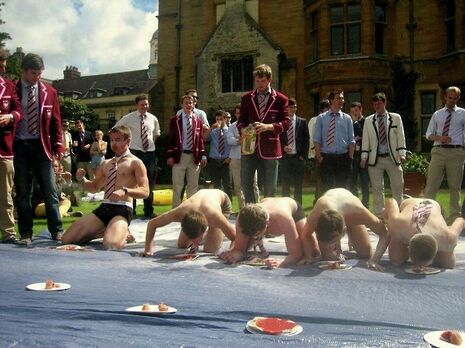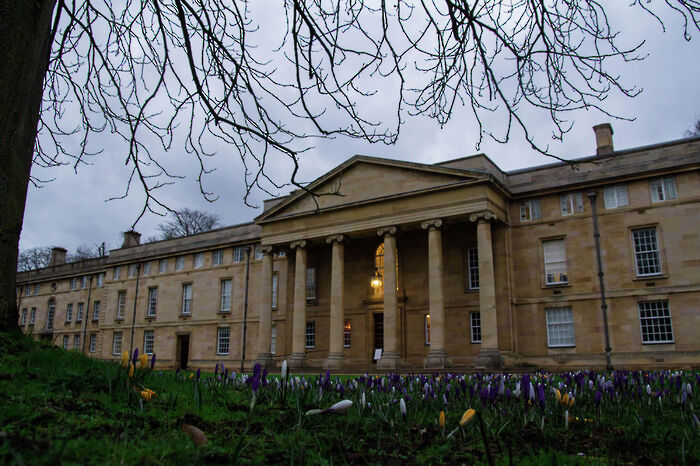No easy answers after a term filled with drinking society scandal
Multiple colleges have claimed they do not have any drinking societies, but their students say otherwise

“What is the single biggest problem facing the Crescents in the modern age?”, asked a Trinity Hall student in the now-infamous video of the drinking society’s Caesarian Sunday gathering. His answer, “inclusivity”, sparked a controversy about Cambridge drinking societies that has reverberated throughout the University ever since.
The Crescents swiftly disbanded, in what initially seemed like the start of a University-wide reckoning about whether drinking societies still have any part to play in Cambridge student life, with Vice-chancellor Stephen Toope calling for University action on the issue, saying that he is “not sympathetic of any organisation where the primary purpose is to drink.”
But this apparently revolutionary culture change has so far failed to be reflected in the figures of reported incidents of misconduct. The University’s Breaking the Silence procedure for reporting harassment and sexual misconduct received 15 and eight anonymous reports in May and June respectively, compared to 19 and ten in March and April.
Varsity reached out to the 17 colleges whose drinking and sports societies had been mentioned in Grudgebridge posts, asking whether they had received any direct complaints related to the behaviour of drinking societies since the Crescents scandal. None of the respondents reported any complaints.
A number of colleges – Peterhouse, Churchill, St Catharine’s, Fitzwilliam, and Murray Edwards – told Varsity either that drinking societies were banned from holding events on college premises, or that the college does not have any drinking societies.
Yet it is unclear how far these rules can be policed. Varsity has seen evidence that two St Catharine’s drinking societies, the Kittens and the Alleycatz, held a garden party on college property last week, hosted by the Kittbag, the official college sports society, despite St Catharine’s Senior Tutor, Paul Hartle, claiming: “We have no drinking societies.”
Varsity understands that the college regards the Kittens and Alleycatz to be sports societies, but a St Catharine’s student, who wished to remain anonymous, said that the groups function as “drinking societies”, which students are “secretly invited to join” on an exclusive basis, “not on the basis of sporting accomplishment.”
The line between drinking and sports societies often appears to be blurred. At an open meeting earlier this term, Pro-vice chancellor for education Graham Virgo, recounted having banned a drinking society while he was Downing’s senior tutor before reintroducing it “as a sporting society, open to all”, a strategy which he said allowed colleges to “make sure, certainly, that [societies are] not just there for alcoholic consumption”.
However, a current Downing student, who spoke to Varsity on condition of anonymity, questioned the efficacy of this. They said that Downing’s drinking societies – the Patricians and the Orchids – “exert a much larger influence” than the sporting society, the Griffins. The student added that, despite not being “officially recognised by the college”, the drinking societies “hold an annual garden party in the middle of college organised through college officials, so I find it difficult to believe that their existence is unknown to them.”
Before Varsity received responses from the remaining colleges, the University issued a blanket statement on the issue, in which Dr Mark Wormald, Secretary of the Senior Tutors Committee, said: “Staff and students across Cambridge’s colleges are meeting currently to discuss how best to promote a culture of zero tolerance to harassment, particularly in regard to drink-related activities of certain groups.” Wormald went on to urge “any student who has experienced misconduct in any form to ask for help from their College’s pastoral team, or their student social welfare officers.”
CUSU has begun drafting a code of conduct for drinking societies collaboratively with drinking society members, which President Daisy Eyre said she hopes will harness current “mobilised student passion” regarding the issue. However, of the 25 drinking society members who initially signed up to be involved, fewer than ten have since responded to an attempt to arrange a meeting.
In an interview with Varsity, Eyre emphasised the central role of JCRs in tackling the issue. Although a number of JCRs have encouraged students to submit official complaints, some have taken a stronger stance.
Earlier this month, Downing JCR announced the abolition of the roles of head freshers’ representatives in the wake of allegations about the links between the positions and college drinking societies. President Jed Soleiman said the JCR did not “feel it’s appropriate for a drinking society to run the introduction the freshers get to the College.”
Following an emergency meeting in May, Newnham JCR condemned drinking societies as an “anachronistic remnant of a drinking culture which perpetuates elitism, classism, compulsory heterosexuality, and irreparably damages efforts at post admissions access”, and resolved to “implore” the College to officially disband its drinking societies.
In a statement to Varsity, Lola Olufemi, CUSU women’s officer and head of the Women’s Campaign, condemned the “exclusive and elitist nature of drinking societies” and said that they encourage “a culture of complicity where sexual violence and misconduct is encouraged”.
“Colleges refuse to clamp down on said societies despite allegations”, Olufemi continued, claiming that drinking societies “may even manipulate the system to get funding from their colleges”. She said the outpouring of allegations did not surprise her, stressing the need for “specialist aftercare support for survivors, robust reporting mechanisms and in-house services that they can access.”
If you are affected by any of the issues raised in this article, the following organisations provide support and resources:
- Breaking the Silence: the University’s campaign against harassment and sexual misconduct (includes reporting mechanisms).
- Sexual Assault and Harassment Adviser: specialist University support worker who provides emotional and practical support
- Cambridge for Consent: a student-run campaign to promote consent.
- Cambridge Rape Crisis Centre: a charity for female victims of sexual violence.
- Cambridge Nightline: a confidential night-time listening service.
- Students’ Unions’ Advice Service: the Students’ Unions’ confidential, independent and impartial advice service.
 News / Judge Business School advisor resigns over Epstein and Andrew links18 February 2026
News / Judge Business School advisor resigns over Epstein and Andrew links18 February 2026 News / Gov grants £36m to Cambridge supercomputer17 February 2026
News / Gov grants £36m to Cambridge supercomputer17 February 2026 News / Hundreds of Cambridge academics demand vote on fate of vet course20 February 2026
News / Hundreds of Cambridge academics demand vote on fate of vet course20 February 2026 News / CUCA members attend Reform rally in London20 February 2026
News / CUCA members attend Reform rally in London20 February 2026 News / Union speakers condemn ‘hateful’ Katie Hopkins speech14 February 2026
News / Union speakers condemn ‘hateful’ Katie Hopkins speech14 February 2026











